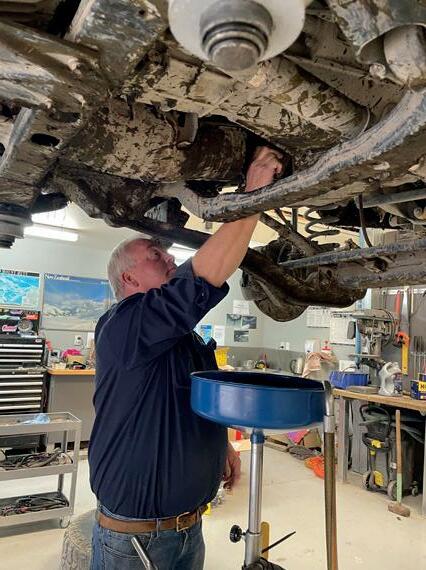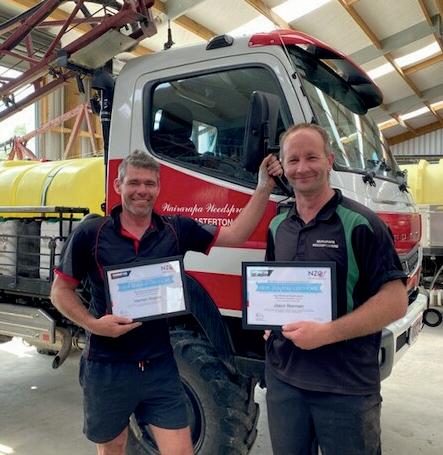
4 minute read
Hard learned lessons drive service schedule
For rural contractors, keeping their machinery running is vital. That’s why they take maintenance so seriously. Here, two members of Rural Contractors New Zealand share their experience.
It’s early March and Mark Forde, who manages maintenance for North Canterbury-based Gilchrist Brothers Ltd spraying contractors, is yet to have his Christmas holidays.
Not that he’s too worried. The former Southland farmer says he’s never been a big one for long breaks – and that’s a relief to Peter and Andrew Gilchrist, whose Swannanoa-based business keeps growing. Integral to that is a robust maintenance programme on the company’s fleet of four spray trucks, a Case Patriot self-propelled sprayer and associated trucks, pumps, two 8000 series John Deere tractors and other equipment. Mark, now 57, started a diesel mechanics apprenticeship in Southland many years ago but that opportunity dried up when the business went bust and since then he’s continued learning on the job. “I’m sort of an all-round handyman.” One thing he certainly has learned has been the critical importance of regular maintenance, especially through the busy spraying seasons. The four Landcruisers and the equipment they carry for spraying are given a service after every 150 hours of operation, which might only be 3,000km travelled. “They get a complete going-over.” Mark says they face some tough conditions – either dealing with deep ruts left by pivot irrigation or the random rocks sticking out of Canterbury hill country. “They do hit those ruts and rocks pretty hard at times.” So he and his offsider, Ryan Schumacher, who form the vehicle repair and maintenance team at Gilchrist Brothers, give the vehicles and sprayers a service at intervals that can be less than a month apart. That includes a thorough check for any cracks or damage; if a part is showing any signs of wear it’s replaced, even if it might still have some life in it, by an authorised factory replacement. Mark says you learn after a while that a cheap replacement is cheap for a reason. “If you buy the correct item first, you don’t have to buy it again.” He sometimes shudders at the monthly parts bill the brothers have to pay, not to mention the huge investment in spare parts that the business carries. These are not only for servicing their own vehicles but many of the other spraying units Mark and his team have built for other contractors.
Mark says there’s a sound reason for the rigour of servicing and maintenance at the company – the consequences of any avoidable breakdown.
“You can’t afford a failure in the season. The day you miss out on spraying is a day you’ve got to catch up on.” In often variable seasons – and this summer has been no exception in Canterbury – a spraying business can’t afford to miss a day’s work. Mark’s holidays, such as they are, may have to wait a while yet.
| Mark Forde gives one of Gilchrist Brothers’ four Landcruisers a well-earned service.
Farmlands is a sponsor of Rural Contractors New Zealand
Hamish knows limits of DIY maintenance
Hamish Rogers has no formal mechanical or engineering qualifications but manages the maintenance of the 20 vehicles owned by Wairarapa Weedsprayers.
The company services over 300 farms from Eketāhuna through to Featherston and out to the coast, applying a range of herbicides, insecticides, fungicides and growth regulants - “Everything it takes to grow a successful crop.” They start seasonal work in September, work non-stop as weather permits through to Christmas/New Year and then pick up again late February (depending on rain) as crops ripen and pasture matures. “Everyone’s got their own trucks and it helps that each is responsible for their own gear,” Hamish says. Things can get a bit stretched through the busy spring and summer seasons with trucks working long hours, day in day out. Hamish helps resolve any mechanical or technical problem that can force a truck to park. “I’ve always been involved in the agriculture industry around machinery so I guess I can call on that background.” This includes stints in the West Australian wheatbelt and in Europe. Hamish has never been one for formal qualifications but last year, age 49, he completed his Registered Chemical Applicator training with industry legend Noel Blackwell. Hamish drives one of Wairarapa Weedsprayers’ trucks himself as well as overseeing the maintenance of the fleet. Usually they do all the repairs themselves but when it’s a major issue, they call in the experts. “A little bit of knowledge can be dangerous and make things worse – we’ve learned that the hard way.” He says it’s really important to have good relationships with businesses whose skills may be needed at the drop of a hat. His company is particularly reliant on Wairarapa Diesel Services and Sam Carlson Engineering. The full-on maintenance programmes for the company’s six spray trucks and utes, tractors, trailers, forklifts and associated kit await the autumn break from contracting. Often one of the truck drivers will work alongside the diesel or engineering specialist to assist with the work and learn what’s being done. Hamish pretty much grew up as part of the Carroll family and business started in the 1980s by Brendan Carroll. Today it’s run by his son Clinton; Hamish and wife Andrea are shareholders. “Brendan still plays a big role in the office and Clinton’s got the patience of a saint. That rubs off on me and rolls over on to the staff, so we are a busy but happy crew.” Of course, that can all be tested by the next breakdown – will it be a job for Hamish or the experts?

| Hamish Rogers, left, and Wairarapa Weedsprayers workmate Jason Norman with their Registered Chemical Applicator certificates.






